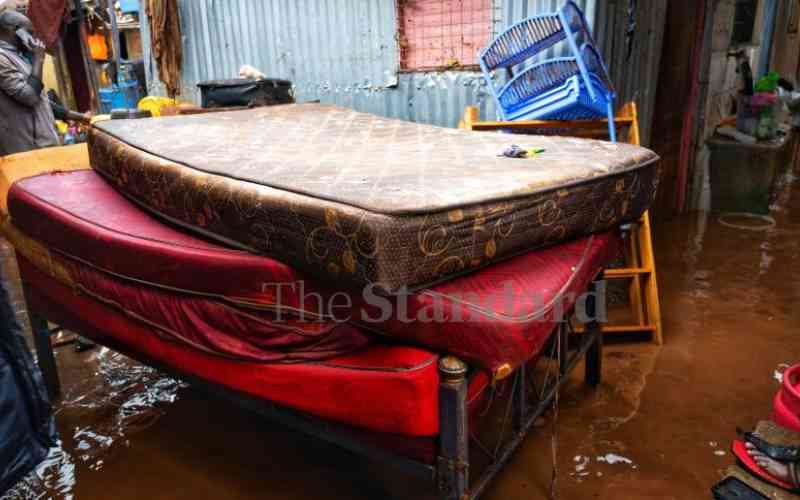NAIROBI, KENYA: Judges who had moved to court to challenge their sacking by the vetting panel have been dealt a blow after the Supreme Court ruled that the High Court had no jurisdiction to review their dismissal.
This decision effectively seals the fate of over 10 judges who were found unsuitable to serve in the Judiciary by the Judges and Magistrates Vetting Board, but who moved to court in a bid to save their jobs.
The judges have cases pending in the Court of Appeal and High Court and have been drawing salaries from their employer, Judicial Service Commission (JSC), pending the hearing and determination of their cases.
Wednesday, the highest court on the land in its ruling allowed the petition by the board and Law Society of Kenya and lifted orders issued by the lower court delivered on October 30, 2010, which had stopped the de-gazettement of judges or magistrates found unsuitable.
The decision now paves way for the board and JSC to degazette all judges and magistrates found unsuitable by the Sharad Rao-led commission.
Chief Justice Willy Mutunga, his Deputy Kalpana Rawal, judges Philip Tunoi, Jackton Ojwang, Mohamed Ibrahim, Smokin Wanjala and Njoki Ndung'u gave the lower courts 15 days to conclude pending cases involving the dismissed judges in accordance with the Supreme Court ruling.
The court also gave the board powers to review its decision in respect to judges who had been found unsuitable and were contesting the decision, and not the High Court as the case has been.
"The lower courts lack of jurisdiction or merit on the part of the vetting board to review its decision," the Supreme Court judges ruled.
The court also bestowed the board exclusive competence to determine the suitability of a judge or magistrate to continue serving in the Judiciary.
"Although this process has been long contested in courts, it is finally time for this court (Supreme Court) to affirm with finality, that the vetting process was a constitutional-transitional imperative, akin to a national duty upon every judicial officer to pave way for judicial realignment and reformulation," the judgment read in part.
Mutunga said he had deeply recognised the struggle and sacrifice of all Kenyans in the Constitution making process and the post-election violence that had rocked the country.
CIVIL WAR
"The constitutional review process, our near immersion into civil war in 2007/2008 and the realisation that everything about public institutions and republican engagement had to be remodeled culminated into the subsequent restructuring of our nation," observed the CJ.
LSK and the board moved to the Supreme Court seeking to insulate the panel from the rising number of litigations by judges and magistrates who had been found unsuitable.
The law body sought to have the highest court overturn a court decision which ruled the vetting board was subject to the supervisory jurisdiction of the High Court, which paved way for aggrieved judicial officers to seek legal redress.
Stay informed. Subscribe to our newsletter
The High Court's decision was upheld by the Appeal court, as appellate judges Patrick Kiage, James Odek and Jamila Mohamed in their judgment dismissed an assertion by LSK that the vetting exercise was a no-go zone for the Judiciary.
LSK lawyer Charles Kanjama submitted that the Supreme Court should determine whether the vetting board's decision could be subjected to review by the High Court.
Judges who had contested their removal include former Court of Appeal judges Riaga Omolo, Samuel Bosire, Emmanuel Okubasu and Joseph Nyamu and High Court judges Jeanne Gacheche, Joyce Khaminwa and Grace Nzioka.
A five-judge bench, Jonathan Havelock, Eric Ogola, Pauline Nyamweya, Alfred Mabeya and Joseph Mutava, had restrained the President from degazetting them.
 The Standard Group Plc is a
multi-media organization with investments in media platforms spanning newspaper
print operations, television, radio broadcasting, digital and online services. The
Standard Group is recognized as a leading multi-media house in Kenya with a key
influence in matters of national and international interest.
The Standard Group Plc is a
multi-media organization with investments in media platforms spanning newspaper
print operations, television, radio broadcasting, digital and online services. The
Standard Group is recognized as a leading multi-media house in Kenya with a key
influence in matters of national and international interest.
 The Standard Group Plc is a
multi-media organization with investments in media platforms spanning newspaper
print operations, television, radio broadcasting, digital and online services. The
Standard Group is recognized as a leading multi-media house in Kenya with a key
influence in matters of national and international interest.
The Standard Group Plc is a
multi-media organization with investments in media platforms spanning newspaper
print operations, television, radio broadcasting, digital and online services. The
Standard Group is recognized as a leading multi-media house in Kenya with a key
influence in matters of national and international interest.








